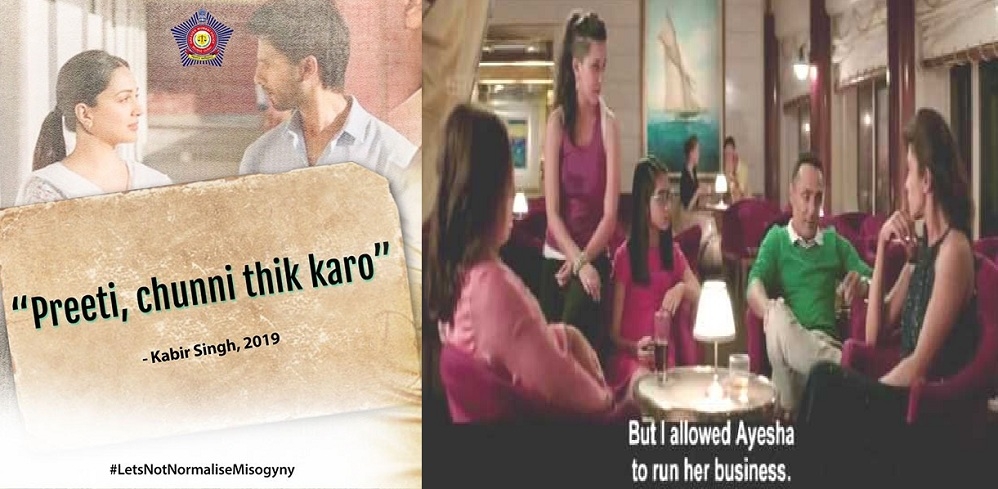‘Cop’ing with misogyny
| Date :06-Oct-2021 |

By Biraj Dixit :
Misogyny – that little something ingrained deep in our consciousness, sometimes hidden behind elegant clothing and sometimes stark naked; hushed often behind sweet tones, murmured at times in undertones and shouted so very often in actions, expressed many times in senile witticism and exhibited in layers and layers of cultural misgivings. That something, always denounced yet always demonstrated, misogyny has again been called into question. Through their Twitter handle, the Mumbai Police have urged people to mind what they say or their hidden misogyny will be visible for all to see. They have used various dialogues from movies to make people understand that what they might think as sentences common and behaviour from everyday life is in fact a show of archaic mindset and is in aid of sexist, discriminatory tendencies. If those on the forefront of maintaining law and order in our society also think that any propagation of misogyny in any form deserves to be decried in such strong terms then it is high time the society looks at all the varied forms of discriminatory behaviours prevalent all over and use strong measures to discredit those. Of course, the cops would know. For, they are patrolling the city.
Just like that
They would know how simple little bad can quickly degenerate into something ghastly. They would know that a criminal is at the far end of the stick. He or she is just an accumulation of bad behavior allowed to get worse with neglect and lack of fair play. He or she is just product of society’s criminal neglect of what ought to be and what shouldn’t have been allowed on the first place. The large number of gruesome crimes against women, be it rape or dowry deaths or domestic violence, all stem from misogynistic perceptions. A nation that has seen and is seeing some of the worst crimes against its fairer sex must understand the urgency required to change stereotype behaviours. It must condemn such behaviours most vociferously. The film industry is, of course, offended for being wrongly interpreted. They say they act as the mirror to the society, showing only what is prevalent. Besides each story needs characters some black, some white and some with plenty of shades of grey. The black ones – the misogynistic ones - are never meant to be role models, they say.
It is not their fault if people pick the bad ones. All of these arguments of course hold water, as does the fact that films have had huge influence on our lives, more than we might admit to ourselves. This brings us to a pertinent question - who is responsible for the influences on one’s life? “Oneself,” you would immediately say and then you might rethink. In many earlier films, heroes were shown teasing the heroines, the latter apparently annoyed yet somehow softening, even impressed. Of course, I do not mean that these served as templates for the very un-gallant eve-teasers and inglorious road romeoes, but they did make an impression. Of course, one can always argue that the hero cooing love notes penned by Anand Bakshi on tunes of Laxmikant Pyarelal in the divine voice of Kishore Kumar can logically convince the audience of his bright chance of winning over his lady love. Yet, the simple intelligence that same notes will inevitably lose their magic when mouthed by a Romeo standing in street corner did not prove a deterrent for the absolutely willing. And the number of ‘absolutely willing’ to be impressed in this country is so huge, so much that the filmdom should, by its sheer success, know this very well. Oh, our films do make an impression. For good or for evil in superlative degrees, I dare say.
Why, presence of a film star even in an election rally can change fortunes! Why, we have elected some great actors (absolutely deserving) to our legislative bodies. So, films do make a huge, huge impact. And people who make films must keep this in mind. By their sheer depiction of misogyny in the society, they are glorifying it. For there are a large, large number of the uninitiated who might not think too deeply into nuances of ‘pyar’ and ‘thappad.’ No denying the fact that some in the film industry, realising the potential to films to impress and bring a change have done a yeoman’s service hitting sometimes subtly and sometime stubbornly at the heart of misogyny in our society. They too have been mirrors to our society but in a different way. It is said of mirrors that while they reflect what is, they often present what is wanted. Much like the ‘beauty lies in the eyes of the beholder’, the truth also lies in the mind. And films, the huge creative enterprise that they are, can hold their mirror to show society’s face keeping in mind its delicate needs. Like all mirrors, they should also trigger a course correction.